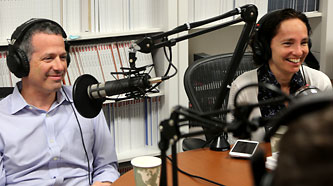With a more conservative lineup of justices, the U.S. Supreme Court could change how it rules on religion cases, as the latest episode of the University of Virginia School of Law podcast “Common Law” explores.
In Episode 9, UVA Law professors Richard Schragger and Micah Schwartzman ’05, along with Cornell Law School professor Nelson Tebbe — who frequently serve as writing partners on op-eds, amicus briefs and other works — look at the future of religion at the court.
“There’ve been a lot of controversies and cases in this area,” Schragger says, pointing to Burwell v. Hobby Lobby Stores, about religious exemptions for providing insurance that includes contraception coverage for employees; Town of Greece v. Galloway, about whether a city council can open a meeting with a (mostly Christian) prayer, argued by Professor Douglas Laycock; and Masterpiece Cakeshop, Ltd. v. Colorado Civil Rights Commission, about a baker who objected to making a wedding cake for a same-sex couple.
By the end of June, the court will decide The American Legion vs. the American Humanist Association, also known as the Bladensburg Peace Cross case. The World War I memorial, built in 1925 on public land to honor local veterans in Prince George’s County, Maryland, has been challenged by the American Humanist Association, a nonprofit atheist organization.
The trio broke down how the Supreme Court’s jurisprudence has played out as they interpret the First Amendment under its two parts, the establishment clause, prohibiting the government from favoring or establishing one religion over another, and the free exercise clause, guaranteeing the right to practice religion free of interference from the government.
“Part of what we’re thinking about and part of what we’re arguing about is the future of the religion clauses: what’s going to happen in how we govern the relationship between church and state going forward, and that’s what these current debates are all about,” Schwartzman says.
Tebbe said the court didn’t start to hand down consequential decisions on either clause until after World War II, in the 1940s and ’50s.

“When we’re thinking about the broad history of the free exercise clause, the main point is, we can see shifts, and we can look into the future and anticipate further shifts,” Tebbe says.
The scholars offer predictions on how that future might look, including what could happen in the Bladensburg cross case, and explain how they frame their own arguments about what the Supreme Court should do.
Schragger is the Perre Bowen Professor of Law and Joseph C. Carter, Jr. Research Professor of Law. His work centers on the intersection of constitutional law and local government law, federalism, urban policy, and the constitutional and economic status of cities, and he also writes on law and religion. Schwartzman, the director of the Karsh Center for Law and Democracy and the Joseph W. Dorn Research Professor of Law, focuses on law and religion, jurisprudence, political philosophy and constitutional law. Tebbe is a constitutional law scholar focused on the relationship between religious traditions and democratic governments.
Hosted by Dean Risa Goluboff and Vice Dean Leslie Kendrick ’06, “Common Law” is available on Apple Podcasts, Stitcher, YouTube, Spotify and other popular places you can listen to podcasts, including Amazon Alexa devices. This episode was recorded at the Virginia Quarterly Review.
You can follow the show on the website commonlawpodcast.com or Twitter at @CommonLawUVA.
Founded in 1819, the University of Virginia School of Law is the second-oldest continuously operating law school in the nation. Consistently ranked among the top law schools, Virginia is a world-renowned training ground for distinguished lawyers and public servants, instilling in them a commitment to leadership, integrity and community service.


